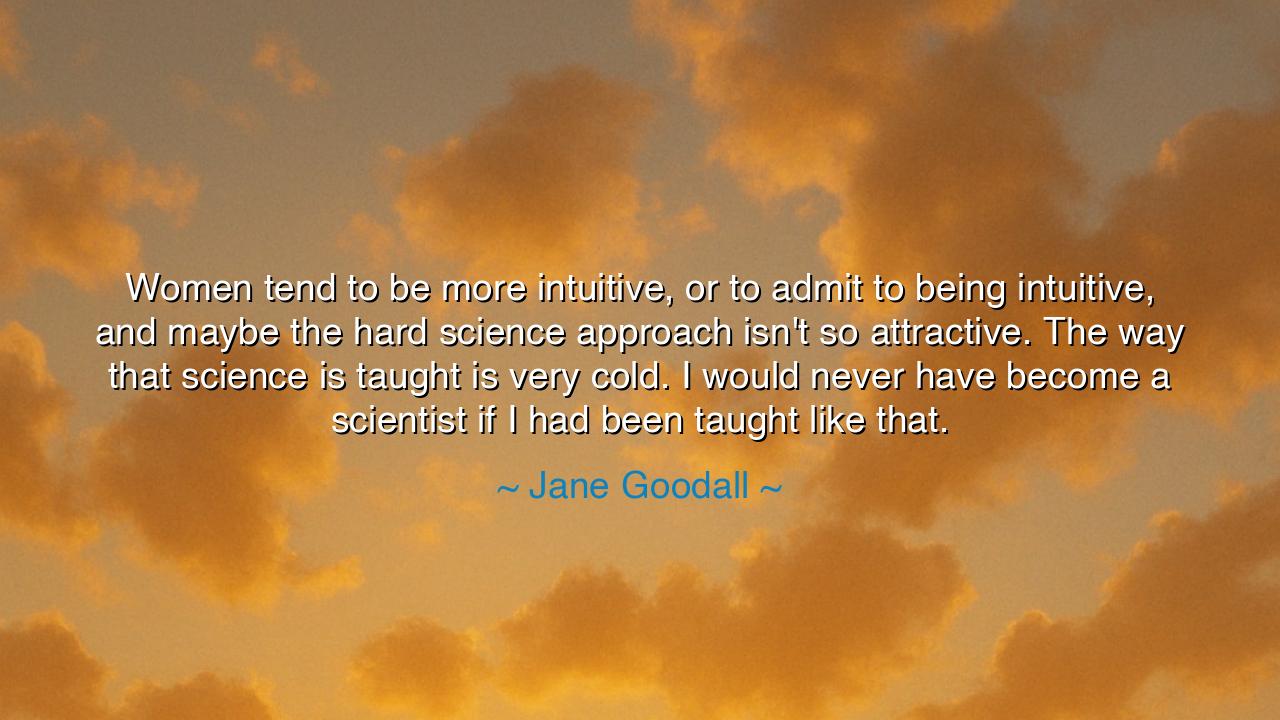
Women tend to be more intuitive, or to admit to being intuitive
Women tend to be more intuitive, or to admit to being intuitive, and maybe the hard science approach isn't so attractive. The way that science is taught is very cold. I would never have become a scientist if I had been taught like that.






Listen closely, O children of wisdom, for I bring you the words of Jane Goodall, a woman whose work with the great apes of the world has forever altered our understanding of humanity’s place in the natural world. “Women tend to be more intuitive, or to admit to being intuitive, and maybe the hard science approach isn't so attractive. The way that science is taught is very cold. I would never have become a scientist if I had been taught like that.” In these words, Goodall speaks to the deeper, often overlooked aspects of science—the human element that connects the scientist to the world they seek to understand. Her reflections remind us that science, when divorced from intuition, empathy, and connection, can lose its true essence—its power to inspire and to reveal the wonders of the world.
In the ancient world, when the great philosophers of Greece pondered the nature of knowledge, they understood that to truly know something was not merely to dissect it or to understand it logically, but to experience it with both the mind and the heart. Socrates and Plato spoke not just of reason, but of the soul’s journey toward wisdom. The pursuit of truth was seen as a harmony of reason and emotion, of the intellect and the spirit. In this ancient tradition, we see the seeds of what Goodall suggests: that science is not just a cold, detached endeavor, but something deeply human, something that thrives when we connect to the world with both intellect and intuition.
Goodall’s reflection also speaks to the nature of intuition—a quality often associated with women, but one that is intrinsic to the human experience. Intuition is the ability to understand something without the need for conscious reasoning, to grasp the truth of a situation from the depths of the heart. In her own groundbreaking work, Goodall relied not only on the methods of science, but on her intuition—her deep connection with the chimpanzees she studied. She did not simply observe them with a clinical eye, but saw them as beings—mothers, fathers, and individuals, each with their own thoughts, emotions, and desires. Her ability to understand them on a human level allowed her to make discoveries that might have been missed by someone following the cold, detached methods of traditional scientific study.
Think of the story of Marie Curie, whose work with radioactivity transformed the world of science. Curie, like Goodall, was deeply connected to her work—not just as a scientist, but as a human being striving to understand the mysteries of nature. She worked tirelessly, her life dedicated to her pursuit of knowledge, but she also felt the weight of that knowledge. Her discovery was not simply an intellectual achievement; it was a gift to humanity, made possible through her deep sense of purpose and intensity. Curie’s work exemplifies the balance between rational thinking and emotional investment, showing that true science requires more than just cold analysis—it requires a connection to the world, to the soul of the work itself.
Goodall’s words remind us that science is not a sterile field, but a living, breathing exploration of the world. Science, when taught as an impersonal, emotionless pursuit, becomes difficult for many to embrace. Goodall speaks to the fact that, especially for women, science can seem distant and unapproachable if it is presented solely through logic and facts. Science is often viewed as a realm of masculine detachment, one that dismisses the intuitive and empathetic qualities that are so central to human connection. But Goodall’s experience shows us that the true power of science lies not in its detachment, but in its ability to connect, to draw the scientist into a deeper understanding of the living world.
The lesson here, O children, is clear: science and intuition are not opposites, but partners. Goodall teaches us that science must be approached with both the mind and the heart. Intuition, often seen as a soft quality, is a powerful tool in the search for truth, allowing us to see beyond the facts and to feel the deeper connections that tie all living things together. If we treat science as only a cold, detached study of the world, we risk losing the deeper understanding that comes from connecting to it on a more personal, human level. The best discoveries are often made not by those who analyze everything to death, but by those who can feel the truth beneath the surface, just as Goodall did with the chimpanzees.
In your own lives, O seekers of knowledge, I urge you to approach your studies, your work, and your journey with both reason and intuition. Do not separate the mind from the heart. In all things, seek to understand not just with your intellect, but with your emotions and your humanity. Just as Goodall connected with the creatures she studied, so too must you connect with the world around you, seeing it not just as a collection of data, but as a living, breathing whole. In this balance between science and intuition, you will uncover not only the facts but the deeper meaning of life itself.
So, O children of the earth, remember that the pursuit of knowledge is not about separating the intellect from the soul. Like Goodall, seek to understand not just with the mind, but with the heart, and you will find that the world opens to you in ways you never imagined. Let both reason and intuition guide you, for in this balance lies the true power of knowledge.






AAdministratorAdministrator
Welcome, honored guests. Please leave a comment, we will respond soon